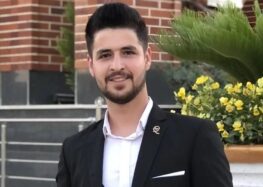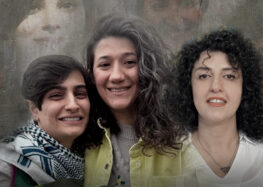Iranian Protesters’ Relatives Threatened With Arrest For Holding Sit-In at Evin Prison
 “We will not go anywhere until we get some news about our kids.”
“We will not go anywhere until we get some news about our kids.”
The families of protesters detained during the anti-government protests that began in Iran on December 28, 2017, have been threatened with arrest for holding a sit-in at Evin Prison in Tehran.
“Since the first night he was arrested, we have been coming to sit in front of Evin Prison to ask about them but they don’t give us any answers,” Shokoufeh Yadollahi, the mother of detained student Kasra Nouri, told the Center for Human Rights in Iran (CHRI) on January 4, 2018.
She added: “Tonight [January 4, 2018], lots of armed forces were called in to mop up 70 to 80 relatives who were sitting in protest against the detention of their children. They told us we should leave or we will all be arrested. We said we are all ready to join our kids inside the prison. We will not go anywhere until we get some news about our kids. All we know is that they are on hunger strike.”
“We are holding a peaceful sit-in to say we want our innocent children released,” she said. “We know they are being held in Evin Prison but four days after their detention we still don’t know what kind of situation they are in.”
“They have had no contact with their families,” added Yadollahi.
Tehran University student Kasra Nouri is a devotee of the Muslim Sufi order known as the Gonabadi Dervishes, whose followers are subjected to state discrimination and imprisonment for believing in an alternative interpretation of Islam.
Nouri and four other dervishes—Mohammad Sharifi Moghaddam, Faezeh Abdipour, Mohammad Reza Darvish and Zafarali Moghimi—were arrested while they were visiting fellow mystic, Hamidreza Moradi, at Day General Hospital in Tehran on December 30, 2017.
Moghimi was released the same evening but the others remain detained without charge.
The detainees are being held in Evin Prison’s Ward 209, which is controlled by the Intelligence Ministry.
According to state-run news agencies, at least 22 people have been killed and more than a thousand arrested between December 28, 2017, when the protests began in the city of Mashhad, and January 3, 2018. Officials have avoided blaming security forces for the deaths, but anti-riot police and the semi-official Basij volunteer militia force, which operates under the control of the Revolutionary Guards, have been instructed to quell the protests.
The University Trade Unions’ Council of Iran (UTUCI) issued a statement on January 1 condemning the arrests of 17 students.
CHRI has learned that in Evin, more than 200 inmates in one ward were transferred to other wards to make room for the new detainees. The authorities of Rajaee Shahr Prison, located west of the capital, have meanwhile allocated a hall with the capacity of more than 150 prisoners to make room for the new detainees, according to a source who requested anonymity for security reasons.
On January 4, the state-funded Iranian Labor News Agency (ILNA) reported that hardline Tehran Prosecutor Abbas Jafari Dowlatabadi had visited Evin Prison and “inspected the condition of the detainees during face-to-face meetings.”
“Some of the suspects expressed remorse and said they had been influenced by propaganda on social media and illegal calls to protest,” claimed the report, which represented the state’s interpretation of the protests.
A day earlier, the prosecutor of Tehran Province, Gholam-Hossein Esmaeili, announced on January 3 that preliminary investigations regarding the detainees had gotten underway.
“By law, detainees can only be held by judicial authorities for 24 hours unless their crimes are proven at the time of the arrest,” he said. “Therefore, there may be some discrepancies in the overall number of arrests reported by officials because some may have been freed for not committing any crimes.”
Six prominent Iranian lawyers have called for the prosecution of Iranian officials who have incited violence against the protesters.
“We demand the immediate termination and independent prosecution of officials whose statements have had a critical impact on inciting emotions and violence during the people’s lawful and peaceful demonstrations,” said the lawyers in a joint statement sent to CHRI on January 3, 2017.
The human rights defenders also called for the release of demonstrators arrested for exercising their right to peaceful assembly, which is guaranteed by Iran’s Constitution.






